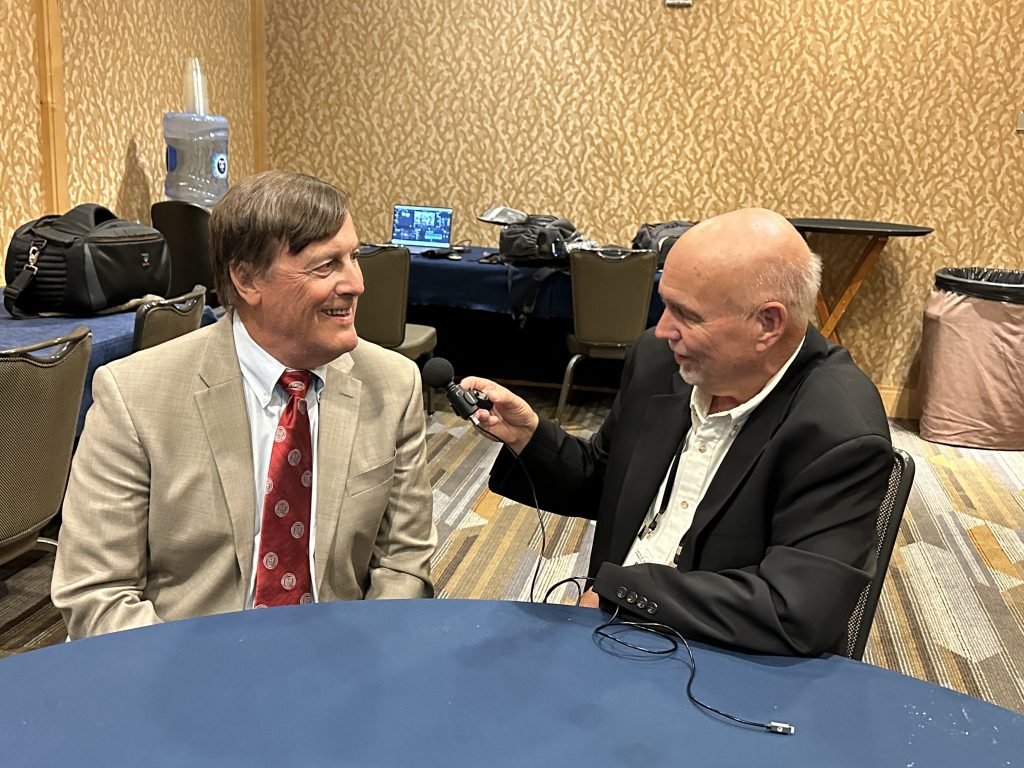
At the Cattle Industry Summer Business Meeting, Senior Farm and Ranch Broadcaster, Ron Hays, caught up with the Gellert Family Professor of Applied Economics and Management at Cornell University Dr. Harry Kaiser about Kaiser’s five-year study of Return On Investment (ROI) for the Beef Checkoff.
Coverage from the 2024 Cattle Industry Summer Business Meeting in San Diego is being powered by Farm Data Services of Stillwater.
By profession, Kaiser teaches and conducts research in the areas of price analysis, marketing, industrial organization, policy, and quantitative methods. He has been hired by the Beef Checkoff to conduct independent studies to thoroughly assess the effectiveness and additional financial benefits produced by the program’s demand-driving activities for decades. At the Cattle Industry Summer Business Meeting in San Diego, he released his most recent study’s findings to cattle industry leaders.
Overall, Dr. Kaiser was impressed with the latest ROI numbers. He said, “There is significant improvement from five years ago, but it is important to know that they were doing extremely well five-years ago and ten years ago. It is remarkable to me that they go from a very high ROI to an even higher ROI.”
The study just released shows a direct impact that delivers $13.41 for each dollar paid into the checkoff-up from the $11.91 for the ROI five years ago.
Dr. Kaiser said that the most exciting thing about this study for him was that, not only did it measure direct effects on the ROI as did every previous Beef Checkoff study, but also indirect effects.
He said, “The direct effects are huge. The study showed that without the Beef Checkoff program, revenue to beef producers and beef importers would have been $3.3 billion lower per year than it actually was.”
He explained further that when those numbers were plugged into a macroeconomic input-output model, which provides a more detailed picture of the flow of products and resources within a given economy and between that economy and the outside world, he found that the Beef Checkoff contributed almost $10 billion dollars to incremental gross domestic product (GDP) in the country.
The ROI analysis also enabled the study to simulate market conditions for beef demand in the absence of national Beef Checkoff investments. For the most recent five-year period, without investment in the Beef Checkoff’s demand-driving activities:
- Total domestic beef demand would have been 2.4 billion pounds (8.5%) lower per year.
- The steer price would have been 7.8% lower per year.
- U.S. export beef demand would have been 372 million pounds (11.5%) lower in the seven major importing countries included in the study.
“I think it’s really important for the Checkoff program and the beef industry to tout these numbers a little bit,” Dr. Kaiser said. “Every dollar invested returned $13.41 in net revenue, or profit, to beef producers and beef importers.”
That figure is up from $11.91 five years ago, and Dr. Kaiser believes the increase is interesting because one would expect that the erosion of inflation on the budget would decrease the ROI over this five-year period.
He said, “To me it must be due to improved efficiency in the staff and the contractors that are running the programs, better allocation of their money across the nine activities, and really effective leadership.”
Dr. Kaiser concluded by saying, “Producers should be very proud of their checkoff program because they are paying into it, they own it. Not only are they getting an excellent return on their investment, but they are also adding a lot of value to the general economy so there is a lot of positive messages there that the checkoff program is a really valuable institution for them and our general society.”
Indirect impacts of the Beef Checkoff to the general economy are increases to:
- U.S. employment by almost 47,000 people
- U.S. employment income by $2 billion
- Total value added to the U.S. economy of $4.1 billion
- U.S. GDP by nearly $9.5 billion
Furthermore, the national Beef Checkoff contributed to increased tax revenue at the federal, state, and local levels, amounting to a grand total of $743 million in 2023, distributed as follows:
- $34 million in county tax revenue
- $205 million in state tax revenue
- $504 million in federal tax revenue
The Beef Buzz is a regular feature heard on radio stations around the region on the Radio Oklahoma Ag Network and is a regular audio feature found on this website as well. Click on the LISTEN BAR at the top of the story for today’s show and check out our archives for older Beef Buzz shows covering the gamut of the beef cattle industry today.


















